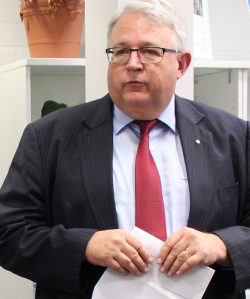Our sincere thanks to Tanya … we are hoping that we can continue to entice her to share her insights

I am very pleased to be taking on the role of Chair of the NYSF, after 12 months as Deputy Chair. I want to acknowledge the work that Professor Tanya Monro has achieved in her two years as the Chair, particularly on the constitutional review of the organisation, and the focus on to strategic planning. Our sincere thanks to Tanya for her commitment, which is particularly of value as an alumna of the National Science Summer School (NSSS)/NYSF, and as a leading Australian scientist and educator – we are hoping that we can continue to entice her to share her insights with future cohorts of NYSF students.
Recently, during National Science Week, a report from the Grattan Institute identified that, “… only half of bachelor degree science graduates seeking full-time work had found it four months after completing their degrees.” It also noted that only half of the recent science graduates who found full-time jobs reported that their qualification is required or important for their job. Three-quarters of engineering graduates however reported being in full-time work – presumably in engineering fields.
For some in the NYSF’s stakeholders, and the wider community, these findings will be somewhat disappointing and concerning – a university degree is an expensive investment, often driven by passion for a specific area. This is particularly the case in the science and technology areas, and definitely how most NYSF participants approach their tertiary study choices. To find at the end of that investment in time, effort, energy and money that your degree is not leading to a job of direct relevance will make many second guess their decision upfront.
At the NYSF, we are confident that our program’s approach actually assists in preventing this kind of disappointment. We aim to assist our participants in exploring options, explaining the cross-collaboration that occurs in industry, and allowing a better understanding than a school-based, siloed, subject focus. We support informed decision-making for future study and careers. We also encourage the development of critical thinking skills, and illustrate how an entrepreneurial approach – which is not everyone’s bent, of course – can turn a “science career” into more than being in a lab, wearing a white coat. There are many different kinds of scientist – attending the NYSF can help to guide our participants through their decision-making, both immediately after school and into the future.
At the time of writing, all of our participants for the NYSF 2017 year 12 program have been selected by our friends and colleagues in Rotary Districts across Australia. We look forward to welcoming the participants in January and seeing their understanding develop as a result of their involvement and investment in the NYSF opportunity. They will have exposure to a wide variety of interesting lectures, science visits and outreach activities, supported by many in the Canberra region, but particularly at our host university, the Australian National University.
I also look forward to continuing to work with my colleagues on the Board and the corporate team to ensure the ongoing sustainability of the NYSF, its programs and the impact on the young people who participate.
Andrew Metcalfe, AO